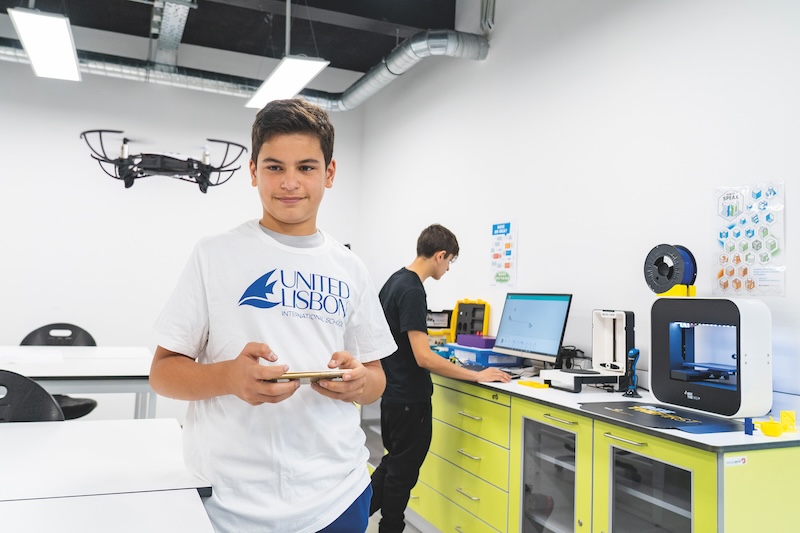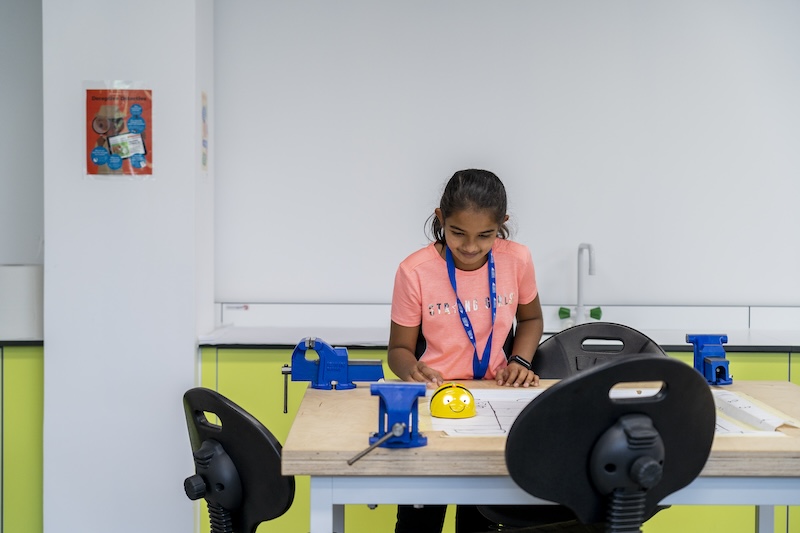How technology engages students and boost skills
Posted on 22nd Mar 2024 in School News, International Education, International Schools, Technology
Kyriakos Koursaris, Education Technology Specialist at United Lisbon International School, Portugal, on understanding the role of digital technologies in education and preparing our children for the future.
How are we preparing our kids for the current and future world of technology at United Lisbon? Our Education Technology Specialist, Kyriakos Koursaris, talks about how educational transformation through the integration of new technologies is one of the core pillars for promoting active learning at United Lisbon International School
Educational transformation through the integration of new technologies is one of the core pillars for promoting active learning at United Lisbon International School. However, computers, interactive panels, and specialized software are only tools. To truly reap the benefits of this transformation, we recognize that students today learn differently than generations before them. Rather than replacing the curriculum, technology enhances it, leading to deeper student engagement and boosting important skills like creativity and collaboration that students will need in tomorrow’s workforce.
We look at the use of technology not just for the transmission and consumption of information, but also as a connector and amplifier for deep learning. Deep learning, as defined by a recent paper published by NPDL (New Pedagogies for Deep Learning) and Microsoft, is the “process of acquiring the six Global Competencies: character, citizenship, collaboration, communication, creativity, and critical thinking”. These competencies, “describe the skills and attributes needed for learners to flourish as citizens of the world and encompass compassion, empathy, socio-emotional learning, entrepreneurialism, and related skills for functioning in a complex universe.”
In order to achieve this as efficiently and productively as possible, ICT is not treated as an independent subject that must occupy a single, weekly slot in the school’s calendar, but is integrated across all subjects, curriculums, and learning areas of the school community. In this way, ICT can improve the quality of teaching and learning, focusing not on the technology itself but on the skills and competencies of the 21st century that both teachers and students must develop in order to thrive in a world of constant change and progress. By successfully interweaving ICT into the curriculum, we aim to provide a rich context for learners to communicate, co-operate, and think critically, calculate, and solve problems, applicable across all subject areas and educational environments.

ICT integrated into the curriculum can be transformative in several ways, and the kinds of learning activities that promote higher-order thinking skills, which make use of all sorts of software and online project-based resources are, in turn, demanding that we all re-think traditional pedagogies. All of this is having a deep impact on our understanding of the curriculum, in terms of what a curriculum is, who develops it and how it is executed, communicated, and enhanced, and in what ways ICT can help students develop more critical responses to the information they access.
Our Technology Director, Kyriakos Kourasaris who recently spoke on a panel for The International Schools Network about the adoption of technology within education settings, including how technology has impacted the teaching of traditional subjects and has been driving several exciting technology lead programs at United Lisbon. This June, saw the school host and set up its first TedEx United Lisbon, all about breaking barriers.
ULIS Sports Club provides an opportunity for middle school students to experiment with academically led theorem for gaming strategy using the latest immersive VR headsets and gaming systems. While older high school age students, focused on specific video games, attempting to simulate the regulations and conditions of official FIFA23 tournaments. Students were able to connect with the official Sporting Clube de Portugal FIFA Esports team, and to visit their installations at the José Alvalade Stadium.
Running for a number of years, via the school’s connection with Microsoft, the schools ran a collaborative projects leveraging, Microsoft’s Hololens2 technology. Partnering with Arribada Club in São Tome and Principe, students in both locations are given the opportunity to interact with "homemade" educational augmented reality content, while exploring concepts such as 3D printing, 3D scanning and the metaverse. ‘Teleporting Nature’ saw students set up their own immersive museum showcasing their work and learn a more about animal conservation, endemic and endangered species.
The impact of the pandemic, the continuing advances in digital technology, and the demand for student-centered learning have combined to present a unique opportunity to transform education across whole systems. This powerful shift to a learner-centered system will be amplified by technology and driven by education that is steeped in purpose and meaning. As Barbara Holzapfel, General Manager for Microsoft Education summarizes it: “As we look to the next school year and beyond, system leaders, educators, faculty, students, and families will apply what they’ve learned throughout the process, and work together to plan and shape the future of education.”
This article first appeared in the 2023/24 edition of John Catt's Guide to International Schools, which you can read here: